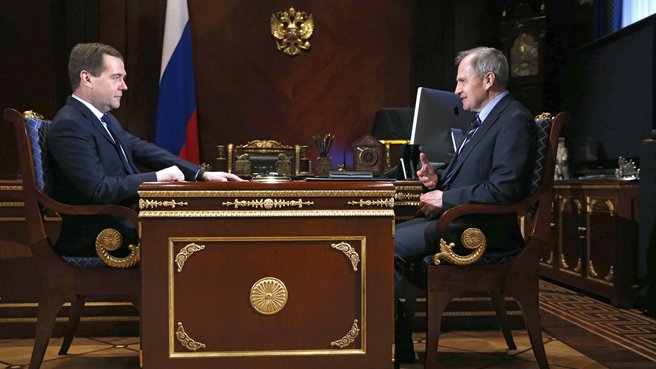On the Government’s implementation of the Constitutional Court’s decisions.
Transcript of the beginning of the meeting:
Dmitry Medvedev: I think there were 39 unfulfilled decisions. I’d like to emphasise that the executive authorities have reviewed all decisions, and the Government has either adopted resolutions on them or submitted draft laws to the State Duma by way of legislative initiative. I think this testifies to a new legal practice that should be adopted by all branches of power. I believe we are moving in the right direction in developing a law-based state.
In recent time the Constitutional Court has adopted many decisions, including some 40 that deal with executive authorities or the Government. I’d like to mention that we have elaborated drafts, submitted them or adopted some other documents practically on all of these decisions. I think this is the way to go in developing cooperation between the executive and the judiciary, and I’m positive about it. Now I’d like to hear what you have to say.
Valery Zorkin: Mr Medvedev, I wouldn’t want us to exchange compliments and reciprocate your positive statement on implementing the Constitutional Court’s decisions by saying good words about the Government on behalf of the court. Regrettably or luckily, hardly any government in today’s world immediately fulfils the decisions of the Constitutional Court. This does not happen everywhere. I’d say that absolutely…
Dmitry Medvedev: This does not happen.
Valery Zorkin: This never happens. In any event we are also gathering statistics and monitoring compliance with our decisions. There was not a single case when the Government didn’t immediately react to our decisions by issuing a resolution on a new draft or in some other way. Later on this process may slow down a bit, but it no longer depends on the Government at that point. This happens when the Duma gets involved in the process and a new draft must pass…
Dmitry Medvedev: There is also enforcement.
Valery Zorkin: Yes. This is a certain procedure but in general I’d say that the Constitutional Court doesn’t just exist on paper. It is a mechanism that is operating in the system on a par with other bodies of power, primarily, executive bodies. Eventually people receive laws, a product of the activities of the entire state, via administrators.
Dmitry Medvedev: For the most part.
Valery Zorkin: If they do not get to people, people do not receive anything. Of course, there are problems. New problems arrive one after another but they are different from what we had in 2009 or 2012.
Dmitry Medvedev: Or in 1997.
Valery Zorkin: I won’t even mention this.
All this makes me confident that constitutional justice exists in Russia and is becoming part of our legal culture. I must mention one fact that is sometimes underrated or neglected by some of our politicians, deputies and journalists.
The Constitutional Court and the system of constitutional justice look quite appropriate and befitting not only at home but also on the European and global scene.
Interaction at the national and international level is very important. They often say that the Constitutional Court is against Strasbourg. Let me use this opportunity to say that only once did we not agree with Strasbourg. We are taking cardinal measures to actively implement the provisions of the human rights convention that are virtually identical with our Constitution in the Russian legal system. But there is a host of problems here, especially recently because Strasbourg is making decisions not only related to some individual violations, be it in the penitentiary system or some other sphere where the law is violated by some agents. It is also making so-called pilot judgments that sometimes call into question some aspects of our laws.
I think this is a problem not only for Russia but also for other countries, and it should be resolved in the future. But in general, let me repeat that the Constitutional Court and the system of constitutional justice look quite appropriate and befitting not only at home but also on the European and global scene.
Dmitry Medvedev: I agree. As for decisions of international courts, in the final analysis their competence derives from the will of the states that established them. While it’s an obvious but still topical idea, nobody should forget about the doctrine of state sovereignty or what international law has amassed in the last 150 years of its development. But this is a more intricate matter.
Now we can discuss what we should work on in the near future – both the decisions of the Constitutional Court and the tasks of the executive authorities. <…>











